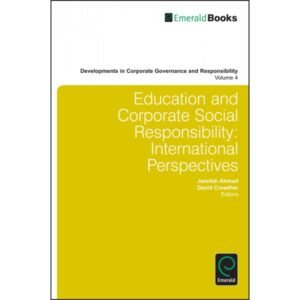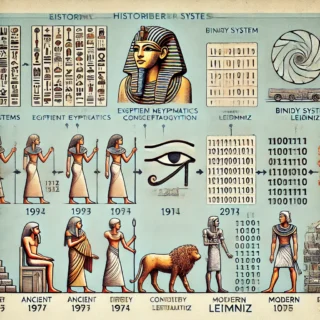
Book Review: Education and Corporate Social Responsibility: International Perspectives
 “Education and Corporate Social Responsibility: International Perspectives,” edited by Jamilah Ahmad and David Crowther, is a comprehensive exploration of how Corporate Social Responsibility (CSR) principles are integrated into educational systems around the world. Given the growing global emphasis on sustainable and ethical business practices, this book is timely. The editors, both esteemed scholars in the field, have curated a collection of essays highlighting the importance of CSR and providing practical insights and case studies from various educational institutions. By focusing on the role of education in training future leaders, the book underscores the need for a paradigm shift in the way business ethics is taught.
“Education and Corporate Social Responsibility: International Perspectives,” edited by Jamilah Ahmad and David Crowther, is a comprehensive exploration of how Corporate Social Responsibility (CSR) principles are integrated into educational systems around the world. Given the growing global emphasis on sustainable and ethical business practices, this book is timely. The editors, both esteemed scholars in the field, have curated a collection of essays highlighting the importance of CSR and providing practical insights and case studies from various educational institutions. By focusing on the role of education in training future leaders, the book underscores the need for a paradigm shift in the way business ethics is taught.
One of the main ethical dilemmas discussed in the book is the environmental impact of copper mining in Chile. This case is particularly striking when compared to other environmental disasters, such as the Deepwater Horizon oil spill or the deforestation of the Amazon rainforest. Each of these cases illustrates the conflict between economic profit and environmental care. The book's discussion of Chile's copper mining practices, with detailed student reflections, provides a microcosm of the broader global struggle to balance profit with ethical responsibility. These examples reinforce the need to integrate CSR into the education system to cultivate a generation of leaders who prioritize sustainable practices.
For example, the chapter on Nottingham Trent University's (NTU) sustainability module provides a detailed insight into how CSR can be integrated into business education, highlighting successes and obstacles encountered during implementation. NTU has been praised for its environmental efforts and includes a special class called the SO module for third-year students at Nottingham Business School. This class focuses on sustainability and business, with teachers from different subjects helping students learn practical tools such as carbon footprint management. These discussions are highly relevant to understanding how CSR education can be applied in practice in institutions around the world, including strategies such as role-playing and experiential learning to engage students effectively. There is a debate about whether CSR is part of sustainability, but the author states that there is a clear overlap between the two concepts. The SO module aims to teach students about the adverse effects of unsustainable business practices and how CSR can help them prepare for future careers by providing theoretical knowledge and practical skills.
What I found particularly interesting was the book's take on students' perception of ethics in international business as part of their courses. The reflections offered by three international students from Poland, Estonia and Kosovo in their essays and reflections on CSR focused on the ethical purchasing practices of the Royal Mint of the United Kingdom. Students examined the copper supply chain. The contributions of Dianne from Estonia, Saranda from Kosovo and Tomasz from Poland add a rich and multicultural dimension to the CSR debate. Each student brings a unique perspective shaped by their country's history, economic conditions, and educational systems. Dianne's insights into Estonia's rapid technological advances and her commitment to lifelong learning provide a backdrop for understanding how CSR can be integrated into rapidly evolving economies. Saranda's experience in Kosovo, a country still facing post-independence challenges, underlines the importance of CSR in fragile states. Tomasz's reflections from Poland highlight the socio-economic transitions following EU integration and the ethical difficulties faced by new market entrants. These diverse points of view enrich the book's narrative, illustrating how CSR is perceived and practiced in different cultural contexts. Dianne, from the relatively young country of Estonia, became independent in 1991 and is known for its fast-growing economy and rapid adoption of new technologies such as Skype. Estonia's education system aims to encourage lifelong learning and citizenship, with higher education structured into bachelor's and master's degrees. Saranda, a 22-year-old young woman from Kosovo, has just finished her master's degree in politics, security and integration at University College London. She is now back in Kosovo to take up a senior position in the OSCE Human Rights Department. Kosovo became independent in 2008, and the American University of Kosovo offers several undergraduate programs, including a popular business school, in partnership with the Rochester Institute of Technology. Finally, Tomasz, originally from Poland, has lived in London for the last eight years and has worked in IT and logistics. Poland joined the EU in 2004, creating many new opportunities and challenges, with over 80,000 Poles moving to the UK; In 2009, 520,000 Polish-born people lived in the United Kingdom, making Poland the second largest emigration country after India.
These students were asked to participate in a study in which they were interviewed about their thoughts on ethics, and their comments were subsequently included in a joint conference paper. The study looked at how students could honestly share their ideas without being influenced by power and how learning occurs in different contexts, such as public, personal and shared. Also discussed were the challenges of students and teachers communicating equally in a classroom, especially when the teacher is their research tutor. The study examined the ethical issues related to a government department sourcing a product from Chile, focusing on students' perspectives through their courses and discussions. Key questions addressed included the learning objectives, the type of learning environment needed, the processes to achieve these objectives, and the roles of participants. It provided information on students' attitudes toward ethical teaching and learning.
Copper mining in Chile has caused serious environmental problems, using a lot of water from one of the driest places on Earth and harming local communities. Workers protested for better wages and benefits, but the government and companies prioritized profits over ethical practices. Guilen González, union leader, states: “Copper mining, like all open pit mining, can never be ethical (Ahmad and Crowther, 2013).” Other comments from industry leaders, such as the CEO, highlight the ethical challenge. He states: “We, at the Royal Mint, are making money for everyone” (Ahmad and Crowther, 2013). When the Royal Mint's supply policies were investigated, “…there appears to be more uncertainty than certainty (Ahmad and Crowther, 2013).” The student’s brief was: “Your task is to provide an interesting and original Financial Times-style paper of no more than 1,500 words assessing the supply chain issues facing the Royal Mint (Ahmad and Crowther, 2013).”
The students agreed that business ethics consists of understanding what is right and what is wrong in the various activities of the company. Although there is pressure to be ethical and achieve good business results, they believe that teaching ethics in business schools is important to developing responsible future leaders.
The book's second part looks at Khosro S. Jahdi's experience at Bradford College. In the early 1990s, while working on a PhD in green ethical marketing, Jahdi was asked to develop a “Marketing Ethics” module for Bradford College. This module became popular with final-year students and was designed to balance ethics' philosophical and marketing aspects, appealing to many students locally and internationally. Over time, the “Marketing Ethics” module at Bradford College evolved significantly, moving from a mix of marketing and philosophy to focusing more on philosophy and renamed “Business Ethics.” When the module lost its appeal, Jahdi was asked to create a new “Corporate Social Responsibility” module, quickly becoming popular among students.
Students chose the “Corporate Social Responsibility” module to learn how companies can be socially responsible and understand the impact of companies on the environment and society. They learned about the importance of CSR, how companies must balance profits with social responsibility, and how CSR practices can help companies improve their image and operations. While some argue that teaching people to be good is ineffective because moral motivation is learned in childhood and not in the workplace, others believe that business schools should promote ethical behavior. It is encouraging that many students study CSR voluntarily, showing great interest. Effective teaching methods, including interactive lectures with questions and answers, helped maintain student engagement and gauge their understanding and interest in CSR topics.
Feedback on the CSR module at Bradford College showed that students had a broad understanding of CSR, which influenced their views on responsible business practices. The module, which integrates lessons from various business topics, helped students see the ethical dimensions of business decisions and prepared them to write dissertations related to CSR, emphasizing its importance in their general education.
Reflecting on the ethical framework
Reflecting on the book's arguments through the lens of the six lenses of the Markkula Center for Applied Ethics at Santa Clara University (Santa Clara University, 2022), the book's emphasis on CSR aligns well with the ethical lenses of equity and community. The arguments presented are in line with the principle of equity by advocating the inclusion of ethical considerations in business decisions and with the principle of community by highlighting the social responsibilities of companies towards their stakeholders. However, there may be some dissonance with the rights lens if the implementation of CSR education overlooks individual freedoms in favor of collective goals. The business school environment tends to focus on teaching management and business as separate and specialized subjects. This approach supports individual academic research but also leads to a fragmented educational system in which different disciplines have little connection or relevance to each other, emphasizing individual freedom and specialization over integrated learning.
Reflecting on the book's arguments through my ethical framework, I find a strong alignment with the principles of equity and community, as emphasized by the Markkula Center for Applied Ethics at Santa Clara University. The book's advocacy for CSR aligns with my belief in fostering ethical awareness and responsibility among future leaders. However, the tension between collective goals and individual rights remains a critical area of consideration. While CSR education should aim to create a socially responsible business environment, it should also respect individual autonomy and freedom. Balancing these aspects requires a nuanced approach that the book aptly highlights through its case studies and theoretical discussions.
Conclusion and future research areas
The book's call for future research is timely and essential to the continued evolution of CSR education. Longitudinal studies could track the long-term impact of CSR education on the professional and ethical behavior of graduates, providing valuable data on its effectiveness. Comparative studies across cultural and educational contexts can identify best practices and highlight the unique challenges of institutions. Innovative curricular designs that incorporate digital tools and interdisciplinary approaches could improve the integration of CSR across various disciplines. These lines of research are crucial to ensuring that CSR education remains relevant and impactful in addressing global ethical challenges.
These areas of future research are crucial to advancing the understanding and effectiveness of CSR education, ensuring that it remains relevant and impactful in addressing global ethical challenges.
Conclusion
“Education and Corporate Social Responsibility: International Perspectives” is a critical resource that sheds light on the vital integration of CSR principles into global education systems. The book's strength lies in its comprehensive exploration of how academic curricula can foster socially responsible leaders, a concept deeply rooted in the social contract between business and society.
The book's chapters meticulously examine real-world applications and theoretical insights, such as Nottingham Trent University's sustainability module. This case study, among others, vividly illustrates the practical challenges and successes of integrating CSR into business education. The contributions of international students provide a diverse perspective, enriching the discourse with their unique cultural and educational experiences.
The section on the evolution of Bradford College's CSR curriculum highlights the dynamic nature of ethics education. It highlights how student involvement and innovative teaching methods can maintain interest in CSR issues, even when the focus shifts from marketing ethics to broader social responsibilities.
When reflecting on the book through ethical frameworks, the emphasis on equity and community resonates strongly. However, the balance between collective goals and individual freedoms remains a nuanced debate, inviting further exploration.
The book calls for extensive research to deepen our understanding of CSR education. Longitudinal studies, cross-cultural comparative analyses, and the development of innovative curricula are essential to the evolution of this field. These future lines of research will ensure that CSR education continues to effectively address global ethical challenges.
The book is a landmark contribution, offering valuable information for educators, researchers, and policymakers. It presents a balanced view of ethical dilemmas in CSR education and inspires future research to prepare students for ethical and socially responsible leadership.
References
Ahmad, J., & Crowther, D. (2013). Education and Corporate Social Responsibility: International Perspectives. Emerald Group Publishing Limited.
Santa Clara University. (2022). A Framework for Ethical Decision Making. @SantaClaraUniv. https://www.scu.edu/ethics/ethics-resources/a-framework-for-ethical-decision-making/



